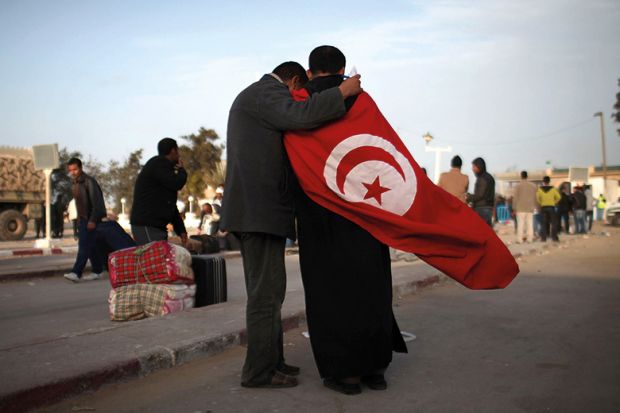Political interest in North Africa has been renewed over the past decade because of the 2010 “Arab uprisings” and their aftermath. Since then, policymakers and researchers have spent a considerable amount of time trying to understand the social and class dynamics of the revolt; the use of new technologies by civil society organisations; and the regional and global political factors that affected the uprisings. While much attention has been paid to the uprisings themselves and to the subsequent refugee crisis, the question of how these uprisings affected the state in North Africa has been rather neglected. This book attempts to fill a gap in the scholarship, tracing how the state has changed since 2010 and continues to be renegotiated.
Luis Martinez’s approach is centred on the relationship between government and society, rightly arguing that the particular form of relationship we find throughout North Africa emerges from a history of imperial and colonial state-building. Yet despite acknowledging this specific history and providing a brief account of nation-building, the book’s main focus is on contemporary state-society relations. This stress on the contemporary dynamics of civil society organisation and mobilisation offers the reader a good understanding of how governments in North Africa – and especially Libya, Morocco, Algeria and Tunisia – have attempted to quell dissent, retain control and build cohesion.
By focusing on contemporary state-society relations, Martinez demonstrates how the state became contested through the inability of authoritarian governments to create environments for social and political transformation. He traces these limitations into the period of the Arab uprisings, using an in-depth comparative approach that discusses the politics of social revolt in Tunisia and Libya and the lack thereof in Morocco and Algeria. By illuminating the dynamics of state-society relations, which were salvaged in Morocco and Algeria but fell apart in Tunisia and Libya from 2010 onwards, the author also points to the social and political opportunities provided to jihadist groups in all four states.
While the argument that jihadist groups have managed to further penetrate the state in North Africa because of the Arab uprisings and the subsequent “deconstruction of the state” is not particularly innovative, Martinez does a good job tracing this development, highlighting the domestic and regional contexts that allowed jihadist groups to proliferate. The book engages in multilevel discussions, ranging from national cohesion, facilitated by public policy and economics, through to regional security dynamics and interstate cooperation. It highlights 2010 as a crucial moment in the development of regional state-society relations, showing how the trajectory of the state was put into question by constraining the traditional patterns of policy used to pacify populations. Although not particularly detailed, The State in North Africa offers readers a strong regional and empirical foundation in the topic and a broad account of statehood that has been somewhat overlooked.
Andrew Delatolla is assistant professor in international relations at the American University in Cairo.
The State in North Africa: After the Arab Uprisings
By Luis Martinez; translated by Cynthia Schoch
Hurst, 236pp, £30.00
ISBN 9781787382961
Published 7 February 2020
POSTSCRIPT:
Print headline: Political upsets and realignments
Register to continue
Why register?
- Registration is free and only takes a moment
- Once registered, you can read 3 articles a month
- Sign up for our newsletter
Subscribe
Or subscribe for unlimited access to:
- Unlimited access to news, views, insights & reviews
- Digital editions
- Digital access to THE’s university and college rankings analysis
Already registered or a current subscriber?









